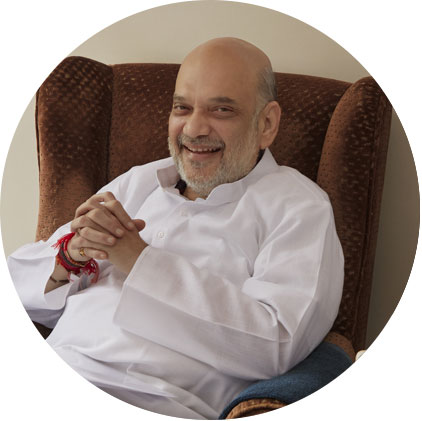Amitbhai Anilchandra Shah, the former President of the Bharatiya Janata Party and India’s Home Minister, was born on 22 October 1964 to a Gujarati couple Mrs. Kusum Ben and Mr. Anilchandra Shah living in Mumbai. Amitbhai Anilchandra Shah's grandfather was a wealthy merchant (Nagar Seth) in Mansa, a small princely state of Baroda State of Gaikwad. Till the age of 16, Amitbhai Anilchandra Shah lived in his native village Mansa in Gujarat. It is there where he received his primary education. The young Shah’s early education took place according to the 'Indian Value Tradition' under the supervision of prominent scholars of the Gaikwad State. He was taught Indian scriptures, historical texts, grammar and epics in his childhood. He continued to study Indian philosophy and texts even in the later years.
Amitbhai Anilchandra Shah's family moved to Ahmedabad after the completion of his primary education. His mother had a deep influence in his life. She was an avid Gandhian and she inspired him to wear Khadi. In his youth, while during education, he read biographies of many patriots and was deeply influenced by their passion for the motherland. He has been greatly influenced by the writings of K.M. Munshi.
Read more
Read less
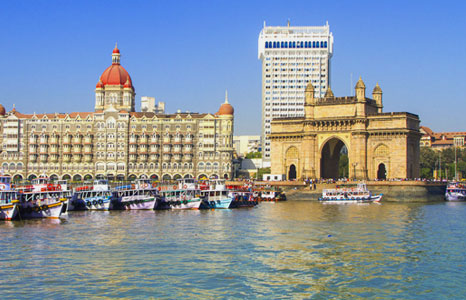
Amit Shah was born to Gujarati parents Mrs. Kusumben and Mr. Anilchandra Shah on October 22, 1964 in Mumbai. He completed 16 years of his schooling in his ancestral village in Mansa, Gujarat and moved to Ahmedabad with his family, thereafter. A patriot and an avid reader since childhood, Shah was inspired by the biographies of the great nationalists and aspired to serve his Motherland and contribute to the country’s progress.

Inspired by its ideology Shah joined Rashtriya Swayamsewak Sangh (RSS) as a Swayamsevak (volunteer) at the age of 16 years in 1980. Shah also started participating in organizational activities of Sangh’s student wing Akhil Bharatiya Vidhyarthi Parishad (ABVP).
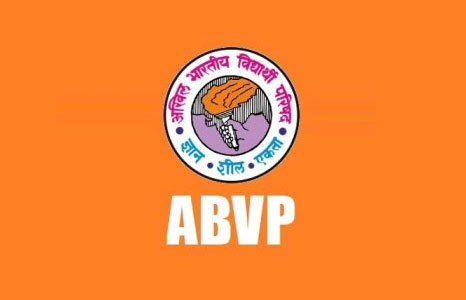
Because of his ideological commitment, organisational and oratory prowess, Shah was elevated to the post of the Joint Secretary of the Gujarat unit of Akhil Bharatiya Vidyarthi Parishad (ABVP) within two years of joining the organization.
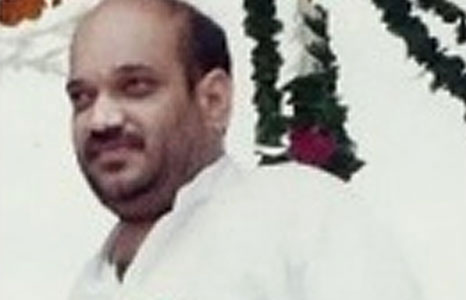
Amit Shah started his politics journey in 1987 when he joined BJP’s youth wing Bharatiya Janata Yuva Morcha (BJYM). He started playing an active role in various organizational programs of BJYM.
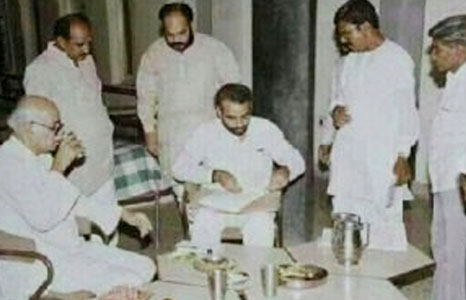
Shah was given the first organizational assignment when he was made the secretary of the BJP Ahmedabad city in 1989. This marked a significant milestone in his political journey.
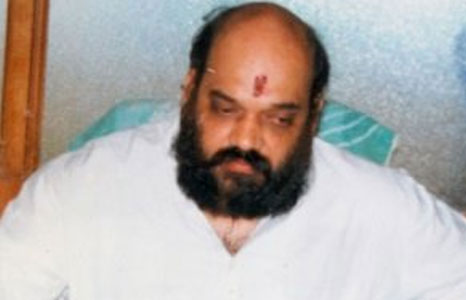
In 1995, Shah was appointed as the Chairman of Gujarat State Finance Corporation (GSFC). His achievements included:
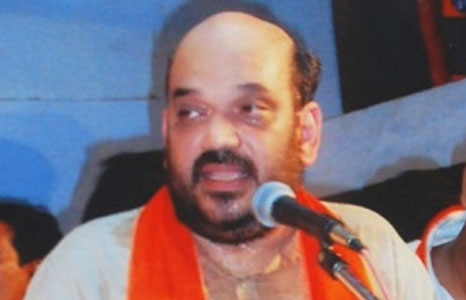
Amit Shah was appointment National Treasurer of the Bharatiya Janata Yuva Morcha (BJYM) in 1997.
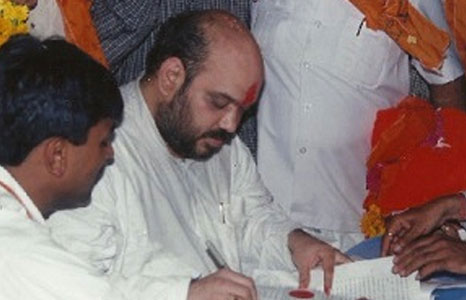
Amit Shah contested the assembly election from Gujarat's Sarkhej Legislative Assembly Constituency in 1997. He won by a huge margin and continued to do so in successive polls, increasing the winning margin every time. He continued to win this seat for four consecutive terms every time with a higher margin. He won the first election by a margin of 24,689 votes that rose more than 5 times to 132,477 votes in the next election. He won his third and fourth term with record margins 288,327(approx. 12 times) and 232,823 votes respectively.
After delimitation Shah's assembly constituency was Naranpura and, the number of voters in this constituency was only one-fourth of that in his previous assembly constituency. However, he still won the election by a huge margin of 63,235 votes. Despite being just an MLA with a meagre Rs.50 lakh as MLA grant, he mobilized thousands of crores from AUDA, The state government and other sources to ensure the development of his constituency.
‘People’s Person’: How MLA Amit Shah’s pioneering work struck a chord with the people
Before delimitation in 2008, Amit Shah’s assembly constituency was the second largest in the state composed of three talukas. With urban development, harnessing youth power, addressing local environment & health issues as his key priorities Shah introduced a series of measures which were strategized to accrue long-term benefits for the residents of the constituency. These included the following:
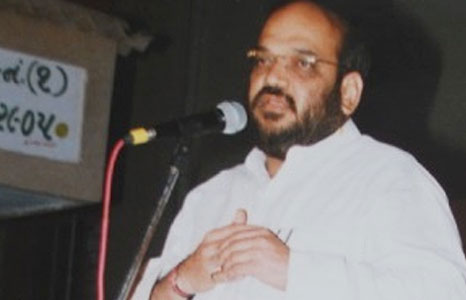
His organizational capacity was recognised by the top BJP leadership and at a relatively younger age of 34 years, Shah was appointed as the Secretary of the Gujarat unit of Bharatiya Janta Party in the year 1998.
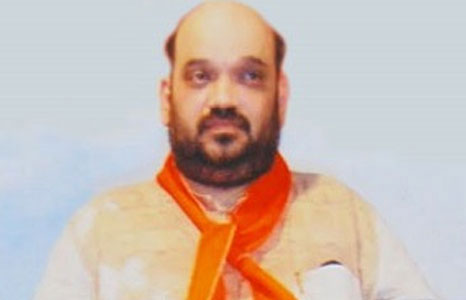
After a year, Shah was entrusted with the responsibility of Vice-President of the Gujarat unit of Bharatiya Janta Party in 1999.
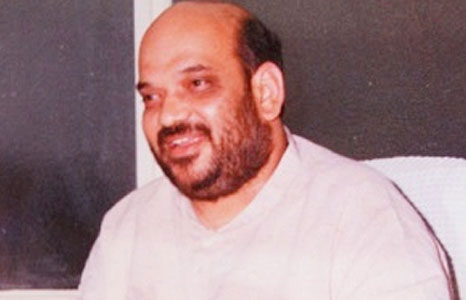
Amit Shah became the youngest Chairman of the Ahmedabad District Cooperative Bank (ADCB) at the age of 36 years. Within a span of just one year, he not only recovered the loss of Rs 20.28 crore but made the bank attain a profit of Rs 6.60 crore and also distributed a dividend of 10 percent.
Notable achievements as Chairman of ADCB
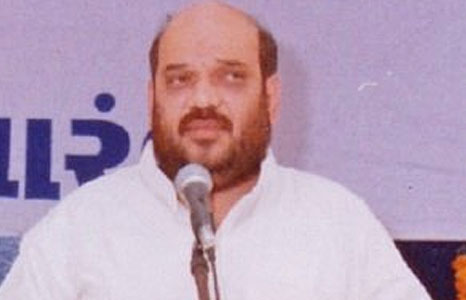
In 2001, Amit Shah was appointed as the National Coordinator of the Cooperative Wing of Bharatiya Janta Party. During this period, his impactful deliveries and proven track record, led his colleagues to adorn him with a new name ‘The Grandfather of the Cooperative Movement’ in his honor.
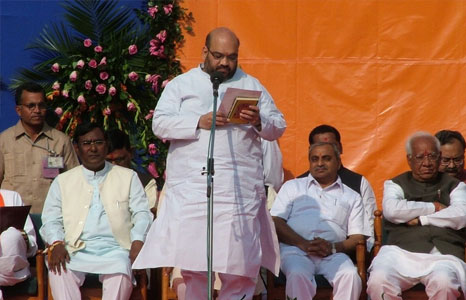
Amit Shah was sworn in as a minister in Gujarat Government for the first time in 2002 and was given charge of important departments like Home, Traffic, Prohibition, Parliamentary Affairs, Law and Excise. His accomplishments as the Gujarat Home Minister was much appreciated. During his tenure the state witnessed a significant drop in crime rates and no communal conflict was reported. While he took significant steps to modernize the state police, in the same vein he was also instrumental in establishing a state-of-the-art Forensic Laboratory. Notably, the world’s first Forensic Science University was started in Gujarat during his tenure. The traffic Branch of police to secure highways was reconstituted which significantly brought down road accidents and highway crimes. Gujarat’s progress in smart policing was praised by the National Crime Bureau, Govt. of India, when it declared Gujarat as the most peaceful state in the country with regard to labour, industrial and farm conflicts. Shah took up several such steps during his tenure as Home Minister under the guidance of then Gujarat CM Shri Narendra Modi, which paved a new path for policing in Gujarat and made the state a role model for other states.
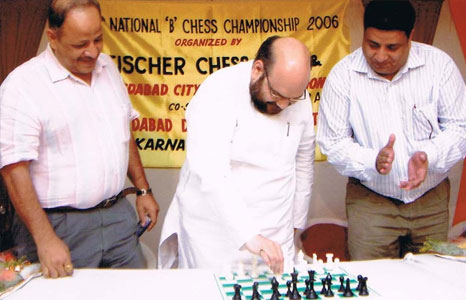
Himself an avid chess player, Amit Shah became the President of Gujarat Chess Association in 2006. It was during his tenure the national chess championship (National-B) was organized in Gujarat.
Significant Achievements
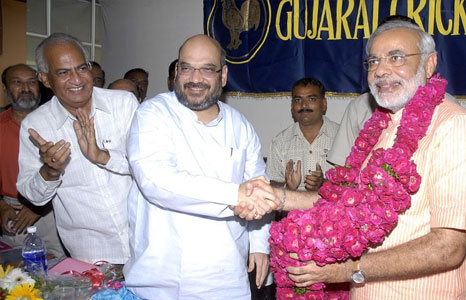
In 2009, Amit Shah was appointed as the President of the Ahmedabad Central Board of Cricket Association and the Vice-President of Gujarat State Cricket Association.
Key highlights of his tenure as Cricket Administrator
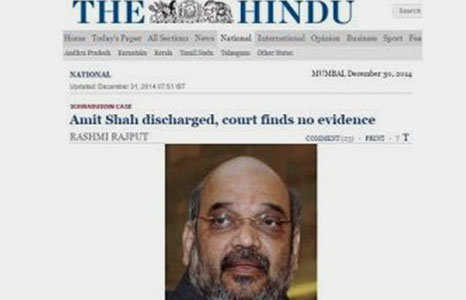
Mr. Amit Shah was sent to jail in 2010 in a fake encounter case concocted to fulfill political grudge He was acquitted from all charges by a special CBI court on the grounds that all accusations were politically motivated.
Entire Case was politically motivated
Under leadership of Gujarat Chief Minister Mr. Narendra Modi, Amit Shah successfully dented Congress party’s political prospects in the state by wiping it out at all levels. During his tenure as home minister of Gujarat, a dreaded terrorist Sohrabuddin Sheikh was gunned down by the state police, the Congress led UPA government at the centre, framed charges of fake encounter against Shah to avenge their political slide in Gujarat. During this period the country recorded 1200 encounter cases and Gujarat just 19. However, due to Congress’ intent of political vendetta, all the 19 cases of Gujarat and just one case from the remaining 1189 cases were selected for the inquiry. When he was granted bail after 90 days, the court observed that “There is no prima facie evidence against Amit Shah”. But despite getting bail, he was forced to stay out of Gujarat for two years. In 2015, a special CBI court finally acquitted Shah of all charges with a remark “entire case was politically motivated.”
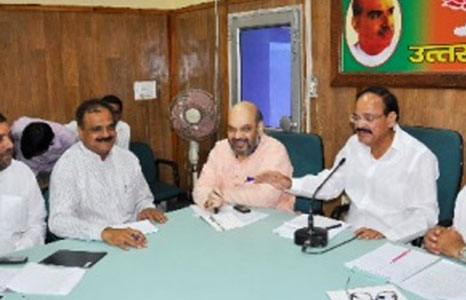
Recognizing the political acumen and efficiency of Shah, the BJP's national leadership made him the National General Secretary before the 2014 Lok Sabha elections and he was given the charge of the politically most significant state Uttar Pradesh which sends 80 MPs to the Loksabha. Under Shah’s stewardship, BJP won a record 73 of the 80 Lok Sabha seats in Uttar Pradesh.
Leading return of BJP in Uttar Pradesh

In 2014, after Shri Narendra Modi became the Prime Minister of India, Amit Shah was appointed the President of "Gujarat State Cricket Association." With his efforts GCA started rebuilding of "Motera Cricket Stadium" which is now known as “Narendra Modi Stadium” and is considered to be one of the best stadiums in the world.
Key highlights of accomplishments as President-GCA
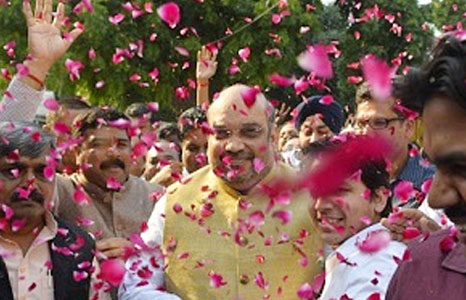
Acknowledging Amit Shah’s organizational capabilities and commitment towards the party's ideology, the senior party leaders appointed him as the BJP's National President in July 2014. At 49 years of age, Shah became the youngest National President, a record that remains unbeaten so far.
Some significant milestones include:
Shah’s tireless efforts and his unflinching commitment to party’s programmes and ideology got him the coveted post of National President in July, 2014. He got second term in 2016 and his entire term lasted till 2019. With political experience and training as a grassroots worker, he seamlessly discharged his duties.
Expanding electoral footprint of the BJP: Prior to 2014, BJP was considered to be a party of Hindi heartland and a few western states. But after 2014, due to the popularity of PM Modi and efforts of Shah, BJP not only further strengthened its hold in its traditional bastions but also expanded to the northeastern, and eastern states and also some parts of the southern states. BJP succeeded in having its CMs in northeastern states of Assam, Manipur, Tripura and Arunachal Pradesh; party also became part of ruling alliances in Nagaland, Meghalaya, Mizoram and Sikkim. North East Development Alliance (NEDA), a brainchild of Shah, played an important role in political growth of BJP in the north east. In eastern India, BJP formed its government in Jharkhand in 2014, NDA returned to power in Bihar and BJP emerged as the main opposition party in Odisha and West Bengal after its historical success in 2019 Loksabha Elections. Despite forming government in Karnataka and winning four Loksabha seats in Telangana, BJP still has to go a long way in the south, though party has increased its voter base in all southern states. However, due to local factors, during Shah’s tenure the party lost assembly elections in Delhi, Rajasthan, Madhya Pradesh and Chhattisgarh. But party retuned with a bang in 2019 Lok Sabha election by winning 70 of total 72 Loksabha seats falling in these 4 states. Prime Minister Modi’s popularity was one of the main factors in all these electoral feats of the BJP between 2014 to 2019. However, Shah’s strategic acumen and organizational skills also played a very important role.
Re-establishing the tradition of ‘Pravas’ (touring): Shah re-established the tradition of Pravas (tours) in the BJP by introducing several new strategic initiatives. Touring was made more effective by introducing concepts like Chakriya Pravas and emphasis on overnight stays. Shah also introduced austerity measures by discouraging five-star culture and travel by chartered planes. Such measures to a large scale succeeded in bridging gaps between leaders and common workers. Shah promoted tour culture by setting example by himself, he became first BJP president to tour all states of India within first year of his tenure and during his tenure he spent at least one night in 90% district HQs of India.
Membership Drive: Shah introduced a transparent technology-based membership drive. Such was the effect of Shah and PM Modi’s popularity that in a short period of time BJP membership rose from 2.47 Cr. to 11.20 Cr. and it became the world’s largest party overtaking Communist Party of China. Thanks to Shah’s efforts today BJP boasts of more than 18 Cr. members. It is noteworthy that only seven countries in the world have bigger populations than the number of BJP members in India.
Training Drive: An extensive training drive was also launched to train newly inducted party members. The objective was to train them about party’s ideology and programs so that they could become active members of the party. Millions of workers were trained in thousands of training camps. Besides this Shah also organized training camps for office bearers and assistants of ministers.
Building offices down to district level: Shah took up ambitious project of building BJP office in every district HQ of the country. Thanks to Shah’s vision the BJP has either a fully furnished office or one in progress in every district today.
Promoting reading by building libraries: An avid himself reader, Shah made libraries an integral part of BJP offices. He also initiated a project to digitize all party documents.
Restructuring Party Organization: Before Shah took over, the BJP organization had dozens of departments and cells. Most of these departments and cells did not have a clear mandate and were dysfunctional. Shah dissolved all of them and scientifically carved out 19 departments and 10 projects with a clear mandate and objectives. He also ensured that this structure is followed in each state organization. He constituted a special team for implementation of this initiative.
Sampark (outreach) for Smarthan (support): BJP under Shah selected 4000 public representatives to reach out to Eminent personalities from different fields. The objective was to educate these opinion makers about good work done by the Modi government and seek their support for the party. Shah himself started this campaign on the 29th of May in 2018 and met formers Chief of Army Gen Dalbeer Suhag & constitution expert Mr. Subhash Kashyap. Shah met about two dozen eminent personalities under this drive.
Pt Deendayal Upadhyay Vistarak Yojana: Shah once said, “to win election one has to win polling booth”. Following this principle, Shah designed this project to strengthen the party at polling booth level. Party workers, who were given the responsibility to appoint booth teams and give them party programs, were designated as Booth Vistaraks. At national level, party appointed 400 thousand Vistaraks. Among them more than 4 thousand were full time Vistaraks (6 to 12 month engagement). Shah himself played the role of a Vistarak and visited 15 booths across five states, starting from Naxalbari of West Bengal.
All India Presidential Vistrit (Extensive) Paravas (Tour): At Bhubaneshwar Executive Meeting of the party in 2017, Shah announced All India Extensive Tour for himself. The purpose was to strengthen party organization and imbibe confidence in party workers. Under the program, Shah visited all states of India spending 3 days in big states, 2 days in medium states and 1 day in UTs and small states. Shah spent 60 days (46 days night stays) travelling more than 50 thousand kilometres. He held 309 organizational meetings and direct interactions with intellectuals, media and other social and economic organizations. During this drive history was made as for the first time National, State, District, Mandal and Booth Presidents of the BJP shared dais.
Strategy for Weak states: Shah devised a strategy to expand party footprint in seven weak states namely Andhra Pradesh, Assam, Kerala, Odisha, Tamilnadu, Telengana and West Bengal. Party leaders panned out in these states, programs were made for PM Modi and Shah himself extensively toured. The strategy worked, BJP formed its government in Assam and increased its Loksabha MP tally from 14 in 2014 to 41 in 2019 in these seven states.
Strategy for North East: PM Modi made the Northeast a special focus area in his programs due to the region's importance in national unity and its potential for development. Shah took it as an opportunity to expand the party to the region. Due to his relentless efforts, the North East Democratic Alliance (NEDA), an alliance of like-minded parties, was formed. Bolstered with the induction of strong local leaders, the BJP/NDA formed its government in all northeastern states including Sikkim. In 2019 the NEDA’s tally in the Lok Sabha swelled from 8 to 18
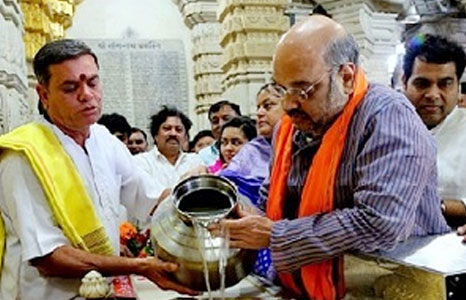
In the year 2016, Amit Shah was made the trustee of the Somnath Temple Trust. Aadi Jyothirlinga Shri Somnath Mahadev Temple is one of the 12 sacred Jyotirlingas, Prime Minister Mr. Narendra Modi and Mr. Lal Krishna Advani are also the trustees of this Trust.
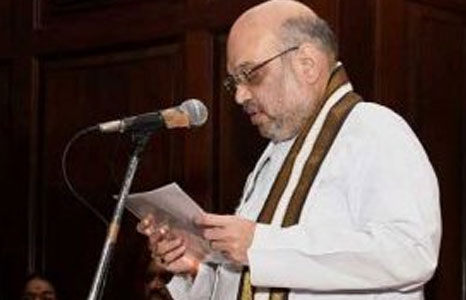
Shah did not contest 2017 Gujarat assembly election and after serving the people as MLA, he entered Indian parliament in 2017 as Member of Rajyasabha from Gujarat.

Being a people’s person, Shah chose to enter parliament by contesting Loksabha election from Gujarat’s prestigious Gandhinagar Loksabha seat in 2019. Former Prime Minister Atal Bihari Vajpayee and Deputy Prime Minister L.K. Adwani also contested in this seat several times in the past. Shah won by a record margin. He defeated his nearest rival of Congress party by a record margin of 5 lakh 57 thousand votes by securing 70 percent votes polled. He took oath as Loksabha member on 17th June 2019.

Took oath as Union Minister in Modi government on 30th May 2019
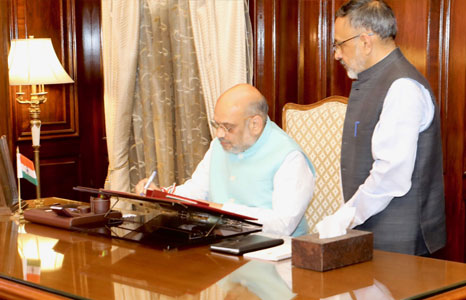
Assume Charge as Union Home Minister on 1st June 2019.
Achievements as Home Minister of India
As Home Minister in Gujarat, Amit Shah used to constantly draw attention to the subjects which were obstructing the security and sovereignty of the country. Today, when he is the Home Minister of the country, he is becoming an important participant in the serious steps taken on those aspects under the leadership of Shri Narendra Modi. During his tenure as the Home Minister, the Modi government at the Center has taken conciliatory decisions on many historical and decades-old issues related to making the country's internal security impenetrable. Though the work is in progress but some of the notable works done in the first three years are as following.
Abrogation of Article 370 & 35A: The path to peace and progress has been opened in the Kashmir Valley due to a permanent solution to a decades-old problem like Article 370. Path to abrogate Article 370 was not an easy one due to various legal hurdles & lack of required majority in the Rajya Sabha. Once again the Chanakya in Shah was at play, he not only navigated across legal hurdles but also managed to garner required support in the Parliament to achieve what had always appeared impossible. Shah made historic speech in the both houses of Parliament and was applauded by none other than Prime Minister Modi himself who gave him full support in implementing this landmark amendment. This historic decision has demoralized and weakened the designs of separatism and terrorism in Kashmir. Grassroots democracy has been reinstated in Kashmir by holding peaceful panchayat elections and now Kashmir valley is experiencing fruits of development like rest of India.
Citizenship Amendment Act (CAA): Besides Article 370, CAA has been part of the BJP's election manifestos for a long time. It was only Shah under PM Modi who not only had the resolve to legislate the CAA successfully but also the courage to do the same. Baffled opposition instigated demonstrations across the country but Shah did not budge and ensured that the CAA becomes a reality. This legislation has given hopes to millions of Indians who were facing unabated persecution on the basis of religion in other countries for decades. Thousand of people have already been given Indian citizenship under the CAA.
Return of peace and Progress in North East: After becoming the Home Minister, Amit Shah also peacefully resolved the pending problems related to the borders of the north-eastern states and internal security there. Vexed issues like Bru-Reang Pact, resolution of Assam-Meghalaya border dispute, resolution of Bodo problem are among few achievements worth mentioning.
Handling Left Wing Extremism & Terrorism: Shah made a concrete strategy on the policy of zero tolerance against left-wing extremism. Today, this menace has been pushed to the corner and is breathing its last. The newly attained readiness of the internal security system to tackle terrorism has reduced terrorist activities to mere sporadic incidents.
New approach to Disaster Management: After becoming the Home Minister, Shah prepared a complete blueprint to organize the new approach to disaster management according to the ten-point agenda set by PM Modi. His approach to disaster management covers all the crucial aspects related to management of calamities beginning from advanced planning to the re-habilitation of affected people. Now the people of India trust National Disaster Response Force and feel safe in the presence of the force even during calamities.
Giant Stride towards Drug Free India: Amit Shah, as the Home Minister, took several steps at the policy level to deal with the challenges of drug trade and drug consumption.
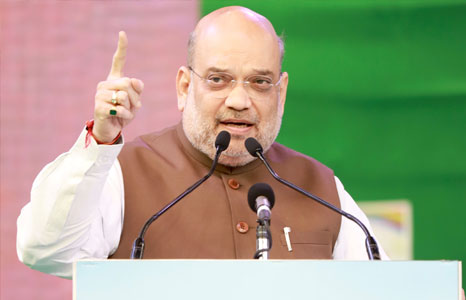
When Prime Minister Narendra Modi formed the Ministry of Cooperation on July 6, 2021, Amit Shah was given its charge. Shah's experience in the cooperative sector is wide and extensive. Under the guidance of PM Modi, Ministry of Cooperation is working with the pledge for “Sahakar Se Samriddhi” (Prosperity through Cooperation). Shah is working with the goal of positioning the cooperative movement for modern challenges while eliminating instability, creating a transparent system and restoring the confidence of the smallest farmer in the cooperative sector. Shah believes that a robust cooperative movement can become growth engine of India and immensely contribute to the country’s GDP.
In a revolutionary step, the Ministry has decided to computerize 63000 PACs across India to ensure maximum transparency and modernization. On the basis of recommendation of Cooperation Ministry, the Reserve Bank of India has decided to increase the housing loan limits of Cooperative Banks by double. In addition to this, now like corporate banks, cooperative banks are also providing door step service to its customers.

Shri Amit Shah scored an even bigger victory in the Lok Sabha Election 2024 than in 2019. This time, he defeated his nearest rival by a vast margin of 744,716 votes. Shri Shah bagged a massive 10,10,972 votes. He took the oath as Lok Sabha Member for the second time in 24 June 2024.

Shri Amit Shah reassumed his role as Union Home Minister for the second consecutive tenure on June 11, 2024.
Shri Shah embarked on his next journey as Union Cabinet Minister, bolstered by the success he attained in his previous tenure. In his first tenure, Shah was adorned by the achievements of abrogating Article 370, containing terrorism in Jammu and Kashmir, the Northeast, and left-wing extremist-affected areas. As the Home Minister, Shri Shah was also credited with the achievement of replacing colonial criminal laws with indigenous legislation, paving the way for comprehensive reform in the criminal justice system.

Shri Amit Shah reassumed his role as Minister of Cooperation for the second consecutive tenure on June 11, 2024.
As the Minister of Cooperation, Shri Shah was celebrated for the computerization of 63,000 PACS and for empowering cooperative banks by doubling their limits for providing housing loans. Now, even cooperative banks can provide door-to-door services.


